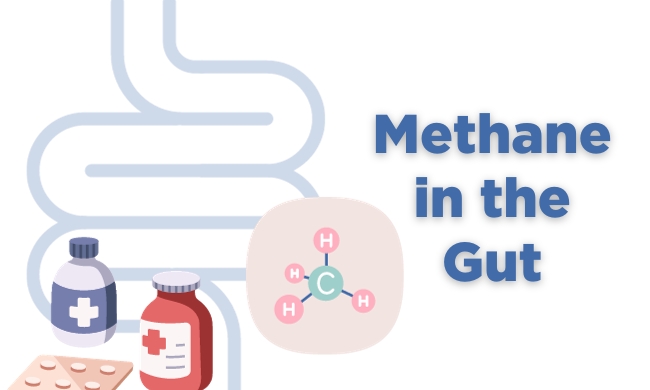We have previously covered what the levels of hydrogen and methane in your breath can tell you about your gut health, associating these two gases with the activity of the microbes in your intestinal tract with conditions such as small intestinal bacterial overgrowth (SIBO) and carbohydrate malabsorption (CM) conditions. But did you know that only approximately a third of people are methane producers? Interestingly, the presence of methane in the gut seems to be something that runs in families, as the majority of people who can produce methane have parents or siblings who are the same (1). So why do we measure the concentration of methane in the gut in the first place?
Hydrogen is produced by bacteria that live in the gut as they ferment the indigestible fiber from our diet. This is a normal process and helps us to extract nutrients from our food, and fermentation by gut bacteria creates many helpful compounds that can support our health and well-being. However, an excessive amount of hydrogen can cause uncomfortable symptoms such as abdominal pain and bloating, especially if this process of fermentation is happening too soon in digestion.
Methane in the gut.
Microorganisms called archaea (2) are almost exclusively responsible for producing methane in the gut. Although they are similar to bacteria in many ways, they have a few key differences in their biology. A type of archaea known as a methanogen can convert hydrogen into methane in the gut. Because this process can lower the levels of hydrogen in the breath, it is important to take the levels of methane into consideration during the diagnosis of conditions such as SIBO – where a false negative result may be given.
Luckily for us, we can accurately measure an excessive amount of methane in the gut through a breath test, as between 20 – 50% of the methane in the gut is excreted in the exhaled breath. We use the recommended North American Consensus of a rise in hydrogen levels of ≥20 ppm in the breath by 90 min after glucose or lactulose was ingested to indicate a positive result for SIBO, and methane levels of ≥10 ppm as methane positive, also providing a threshold for a positive result for SIBO.
An excessive amount of methane in the gut and therefore in the breath can be characteristic of a very similar condition to SIBO known as IMO (intestinal methanogen overgrowth), or sometimes just methane SIBO, as well as constipation (3), and constipation pre-dominant IBS (IBS-C) (4). These conditions can be very uncomfortable and life-limiting, so detecting an excess amount of methane in the gut is important.
If there is too much methane in the gut, what treatments are effective? A number of treatments have been assessed in relation to conditions that are associated with methane levels:
- Herbal antimicrobials (5).
- A combination of rifaximin and neomycin (6).
- The statin lovastatin (7).
- A low FODMAP diet (8).
- Probiotic capsules containing the strain Lactobacillus reuteri (9).
As always, any treatment options should be discussed with your doctor, as they can interpret your breath analysis results and symptoms in context to give you tailored advice. The good thing about breath testing is that you can monitor the success of your treatment through repeated breath samples, ideally aiming to get the levels of methane in your breath below 10 ppm. If you are living with uncomfortable digestive symptoms, breath testing can help to identify whether you have excessive hydrogen or methane levels in the gut, which could indicate the presence of a treatable digestive condition.
The OMED Health Breath Analyzer is a cost-effective, reusable solution designed to measure hydrogen and methane levels in a home setting. When used in conjunction with the OMED Health App, which tracks your symptoms and diet, you can gain a more comprehensive understanding of the potential causes of your symptoms. Join our waitlist to get priority access.
References
- Bond JH, Engel RR, Levitt MD. Factors influencing pulmonary methane excretion in man. An indirect method of studying the in situ metabolism of the methane-producing colonic bacteria. J Exp Med. 1971 Mar 1;133(3):572–88. DOI: 10.1084/jem.133.3.572
- Triantafyllou K, Chang C, Pimentel M. Methanogens, Methane and Gastrointestinal Motility. J Neurogastroenterol Motil. 2014 Jan;20(1):31–40. DOI: 10.5056/jnm.2014.20.1.31
- Kunkel D, Basseri RJ, Makhani MD, Chong K, Chang C, Pimentel M. Methane on breath testing is associated with constipation: a systematic review and meta-analysis. Dig Dis Sci. 2011 Jun;56(6):1612–8. DOI: 10.1007/s10620-011-1590-5
- Hwang L, Low K, Khoshini R, Melmed G, Sahakian A, Makhani M, et al. Evaluating breath methane as a diagnostic test for constipation-predominant IBS. Dig Dis Sci. 2010 Feb;55(2):398–403. DOI: 10.1007/s10620-009-0778-4
- Lai PK & Roy J. Antimicrobial and chemoprotective properties of herbs and spices. Current Medicinal Chemistry. 2004. 11(11):1451-60. DOI: 2174/0929867043365107
- Pimentel M, Chang C, Chua KS, Mirocha J, DiBaise J, Rao S, et al. Antibiotic treatment of constipation-predominant irritable bowel syndrome. Dig Dis Sci. 2014 Jun;59(6):1278–85. DOI: 10.1007/s10620-014-3157-8
- Muskal SM, Sliman J, Kokai-Kun J, Pimentel M, Wacher V, Gottlieb K. Lovastatin lactone may improve irritable bowel syndrome with constipation (IBS-C) by inhibiting enzymes in the archaeal methanogenesis pathway. F1000Res. 2016 Jun 22;5:606. DOI: 10.12688/f1000research.8406.3
- Halmos EP, Power VA, Shepherd SJ, Gibson PR, Muir JG. A diet low in FODMAPs reduces symptoms of irritable bowel syndrome. Gastroenterology. 2014 Jan;146(1):67-75.e5. DOI: 10.1053/j.gastro.2013.09.046
- Ojetti V, Petruzziello C, Migneco A, Gnarra M, Gasbarrini A, Franceschi F. Effect of Lactobacillus reuteri (DSM 17938) on methane production in patients affected by functional constipation: a retrospective study. Eur Rev Med Pharmacol Sci. 2017 Apr;21(7):1702–8. DOI: 10.3390/medicina57070643



